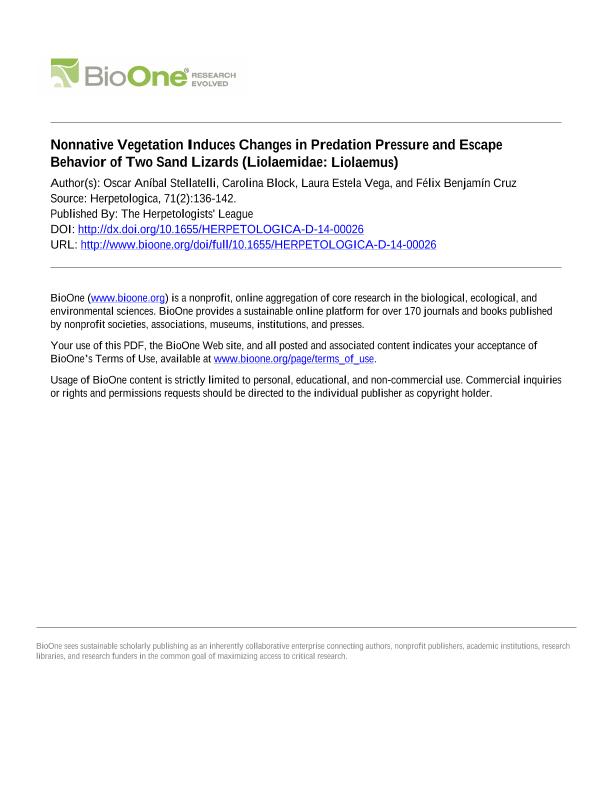Artículo
Nonnative Vegetation Induces Changes in Predation Pressure and Escape Behavior of Two Sand Lizards (Liolaemidae: Liolaemus)
Fecha de publicación:
09/2015
Editorial:
Herpetologists League
Revista:
Herpetologica
ISSN:
0018-0831
Idioma:
Inglés
Tipo de recurso:
Artículo publicado
Clasificación temática:
Resumen
The introduction of nonnative plant species might generate habitat modifications that, in turn, increase the predation risk for animals, either by making prey species more conspicuous, limiting the availability of refuges, or by offering vantage points to potential predators. We compared predation pressure and escape behavior of two sympatric species (Liolaemus wiegmannii and Liolaemus multimaculatus) of Sand Lizards inhabiting forested and nonforested grasslands of the pampasic coastal sand dunes of Argentina. Predation pressure was evaluated by measuring the predation rate on plasticine replicas of lizards and the abundance of avian predators. We also recorded flight initiation distance (FID) of lizards in the different habitat types and the microhabitat used as refuge. Both lizard species prefer refuges in native plants but, when they are scarce, the nonnative Acacia longifolia is selected as alternative refuge. In forested habitats, sand-burying behavior is a complementary strategy used by L. multimaculatus to avoid predation. The FID of L. wiegmannii was greater in forested habitats than in nonforested ones. In contrast, L. multimaculatus exhibited a short FID in forested habitats, mostly because sand-burying behavior appears to reduce the risks typically associated with exposed areas. Plasticity in antipredatory behavior suggests that these lizards could recognize predators and develop a suitable antipredatory behavior. We conclude that increased predation pressure and structural alterations of the habitat in the presence of nonnative A. longifolia affect the decisions that determine how, when, and where these lizards flee.
Palabras clave:
Flight Initiation Distance
,
Habitat Alteration
,
Acacia
,
Detection
Archivos asociados
Licencia
Identificadores
Colecciones
Articulos(INIBIOMA)
Articulos de INST. DE INVEST.EN BIODIVERSIDAD Y MEDIOAMBIENTE
Articulos de INST. DE INVEST.EN BIODIVERSIDAD Y MEDIOAMBIENTE
Citación
Stellatelli, Oscar Aníbal; Block, Carolina; Vega, Laura Estela; Cruz, Felix Benjamin; Nonnative Vegetation Induces Changes in Predation Pressure and Escape Behavior of Two Sand Lizards (Liolaemidae: Liolaemus); Herpetologists League; Herpetologica; 71; 2; 9-2015; 136-142
Compartir
Altmétricas




